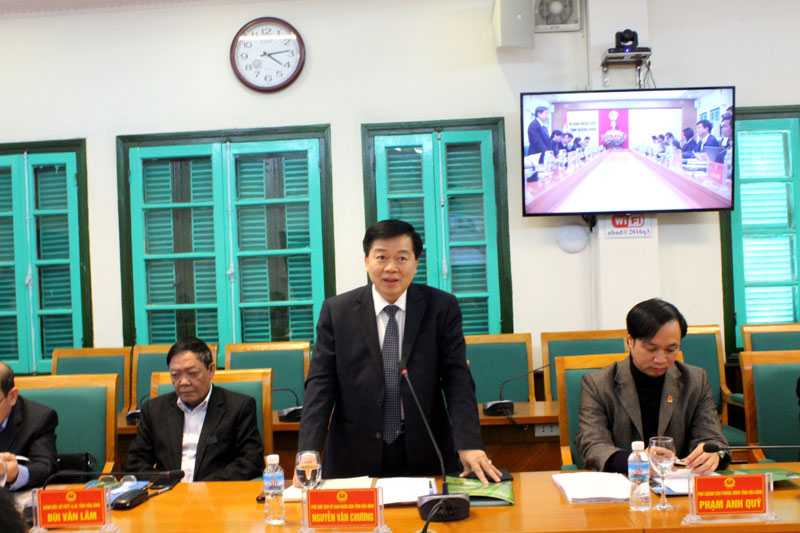
(HBO) – A delegation of Hoa Binh province led by Vice Chairman of the provincial People’s Committee Nguyen Van Chuong had a working session in Quang Ninh province to exchange tourism management experience.

Vice Chairman of the Hoa Binh provincial People’s Committee
Nguyen Van Chuong speaks at the working session.
Vice Chairman of the Hoa
Binh provincial People’s Committee Nguyen Van Chuong said in 2016, the Prime
Minister approved the planning of the Hoa Binh Lake national tourism site,
which is a big opportunity for the province of develop tourism. Hoa Binh
province boasts huge tourism potential, but the development of this sector
remains modest. Meanwhile, Quang Ninh has done a good job of managing Ha Long
Bay. Hence, Hoa Binh wants to learn Quang Ninh’s experience in issuing Ha Long
Bay management mechanisms.
Vice Chairman of the Quang Ninh provincial
People’s Committee Le Quang Tung and other officials briefed their guests about
the management, conservation and promotion of the values of world natural
heritage Ha Long Bay, as well as the tasks, functions and power of the Ha Long
Bay Management Board.
Over the last years, with the provincial
authorities’ drastic direction and the engagement of local sectors, agencies
and localities, the management, conservation and promotion of Ha Long Bay’s
values have been made in an increasingly effective manner. While the bay
management mechanisms have been fine-tuned, resources have been allocated for scientific
research on Ha Long Bay. The province has also worked to transfer the state
management of Ha Long Bay from the Ha Long Bay Management Board to the People’s
Committee of Ha Long city.
Quang Ninh officials said they have enhanced the
management of tourism boats, reformed the management of sightseeing tickets to
prevent losses, and upgraded infrastructure at tourist attractions and
accommodation facilities. The province has also diversified tourism promotion
methods, ensured environmental hygiene at places of interest, and paid
attention to developing new tourism products.
For their part, Hoa Binh officials also informed
about local tourism development and the Hoa Binh Lake tourism site. They highly
valued Quang Ninh’s tourism management, especially of Ha Long Bay.
At the working session, they discussed the
management and bringing into play of Ha Long Bay’s values, tourism planning and
investment attraction, along with organisation and management of culture and
tourism villages. Hoa Binh officials said this is precious experience for their
province to develop the Hoa Binh Lake tourism site in the time ahead
Hoa Binh province is undergoing a dynamic transformation amid Vietnam’s national digital transition. Building on Poliburo’s Resolution No. 57-NQ/TW on breakthroughs in science, technology, innovation, and national digital transformation, the province has rolled out a wide range of practical action plans. A standout initiative is the "Digital Literacy for All” movement, an effort to ensure that no one is left behind in the digital era.
Hoa Binh province is undergoing a dynamic transformation in the wake of the national digital transformation movement. Building on Resolution No. 57-NQ/TW of the Politburo on breakthroughs in science, technology, innovation, and national digital transformation, the province has implemented a wide range of practical action plans. A standout initiative is the "Digital Literacy for All” movement ambitious effort to ensure that no one is left behind in the digital age.
With a spirit of unity and proactive problem-solving, the Party Committee, the government and the people of Dong Lai Commune (Tan Lac District) have made great strides in implementing the resolutions of the 24th Party Congress of the commune for the 2020 - 2025 term. Focusing on leadership and practical actions, the commune has brought the Party’s resolutions into daily life, creating strong impacts and pushing the local development forward.
Amid the nationwide push for digital transformation, young people in Hoa Binh Province are stepping up as dynamic pioneers, applying technology to enhance Youth Union operations and expand the reach of youth-led initiatives. Through creativity and adaptability, Youth Union organizations at all levels have introduced a series of practical solutions, contributing to modern governance and community development.
In recent years, An Nghia commune, located in Lac Son district, has stepped up administrative reform, focusing on improving the quality and efficiency of its single-window service unit for receiving and processing administrative procedures. These improvements have helped create favourable conditions for local residents and organisations to handle administrative procedures, contributing to the commune’s broader socio-economic development.
The Prime Minister-approved master plan to develop the multi-use value of forests ecosystems through 2030, with a vision to 2050, aims to improve the management and sustainable use of forest resources, create jobs, increase incomes, and improve the living standards of ethnic minorities, people in mountainous and remote areas, forest workers and those living near forests.



